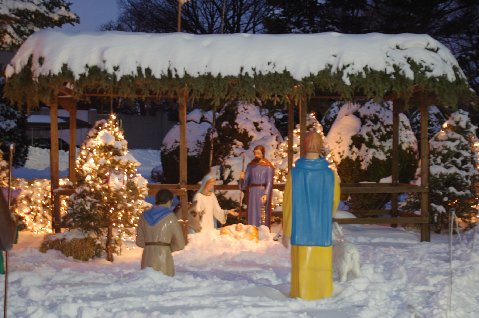Christmas and the Passion of Christ- A reflection
 The Passion of Jesus Christ is the central event of salvation history. This culmination of the life of Jesus, on the surface, may appear to be dramatically different from His early days. Nevertheless there are episodes and in particular, the trial of Jesus by Pilate which seems to possess reverberations or flashbacks to the birth of Jesus.
The Passion of Jesus Christ is the central event of salvation history. This culmination of the life of Jesus, on the surface, may appear to be dramatically different from His early days. Nevertheless there are episodes and in particular, the trial of Jesus by Pilate which seems to possess reverberations or flashbacks to the birth of Jesus.
Meditating the Gospel of John Chapter 18 brings forth some of these insights.
John 18: 33-34
33 Pilate then went back inside the palace, summoned Jesus and asked him, “Are you the king of the Jews?”
34 “Is that your own idea,” Jesus asked, “or did others talk to you about me?”
Pilate is seeking the identity of Jesus. Jesus’ reply is deep and pointed. It is as if He is asking whether the question is emanating from within Pilate, from his soul. Is he personally searching? Is Pilate on the brink of conversion? Or is this merely an external query? Perhaps his question is based on hearsay with a worldly disposition. Or perhaps he is “being evangelized” by others!Jesus’ reply also is a search, for the motive and intent of Pilate’s question.
 The experience of Christmas is reflected rather paradoxically in this passage, as the shepherds who were present at Jesus’ birth “told” others of Jesus, after the angels “told” them. The shepherds evangelized!
The experience of Christmas is reflected rather paradoxically in this passage, as the shepherds who were present at Jesus’ birth “told” others of Jesus, after the angels “told” them. The shepherds evangelized!
Luke 2 16-18
16 So they hurried off and found Mary and Joseph, and the baby, who was lying in the manger. 17 When they had seen him, they spread the word concerning what had been told them about this child, 18 and all who heard it were amazed at what the shepherds said to them.
Jesus was born a King. We sing of His Kingship in our Christmas carols. The First Noel for ex:
The first Noel the angel did say
Was to certain poor shepards in fields as they lay:
In fields where they lay a keeping their sheep
On a cold winter’s night that was so deep.
Noel Noel Noel Noel
Born is the King of Israel.
Jesus’ Kingship is mirrored in the Passion/Incarnation; Incarnation/Passion. The very question of Pilate and his proclamation of Jesus’ Kingship inscribed on the Cross are reflected in the infancy narratives as well.
Jesus eventually and ultimately answers Pilate’s question, as if He had never posed the intervening query. It is significant that Jesus replies. For He is dialoging with Pilate, trying to save his soul. He saw the kernel of hope in Pilate’s being.
Pilate goes on:
35 “Am I a Jew?” Pilate replied. “Your own people and chief priests handed you over to me. What is it you have done?”
 Pilate appears to take a spiritual step backward with his answer. It is much more superficial and strictly on the political plane. There is nothing evident of an inner journey now. His question, what is it you have done? moves the conversation in another direction entirely. He proceeds from Who are you to what do you do- from Identity to Function.
Pilate appears to take a spiritual step backward with his answer. It is much more superficial and strictly on the political plane. There is nothing evident of an inner journey now. His question, what is it you have done? moves the conversation in another direction entirely. He proceeds from Who are you to what do you do- from Identity to Function.
Juxtaposed against Jesus’ Infancy, one can meditate that “His own people”, especially his holy Mother Mary, “handed Him over, delivered him, at birth, not only to his Jewish people, but as Light of the world, to Gentiles and those considered as pagans. She shared Her Son with shepherds, Wise men and others who came to adore.
Jesus is always being handed over to others, by various believers, for their salvation. Even the handing over to Pilate was for Salvation, which would be accomplished on the Cross.
Jesus replies to this new input from Pilate.
36 Jesus said, “My kingdom is not of this world. If it were, my servants would fight to prevent my arrest by the Jewish leaders. But now my kingdom is from another place.”
The depth, meaning and direction of this dialogue are on different tracks or levels and this is significant. Jesus is re -directing His answer back to the original question which up to now has not really been answered.
He begins to reveal His Kingdom, by saying what it is not, an outline carved by that which is pared away. It IS, but Not of here, of this world. External worldly ways will not lead to it. He even exonerates his followers for abandoning Him by underscoring that action as proof of why the Kingdom is not of the world! Something else is at work here. Jesus is trying to lead Pilate back to the personal and the other-worldly. He repeats it again, that His Kingdom is not of this world. Yet Jesus calls it “My Kingdom”
 What is the reflection of Christmas here? Jesus by implication is saying that His birth, too, is not of this world. The Virgin birth at which Angels appeared, testify to the supernatural nature of this holy event. It is the “in-breaking” of “another world” upon this one.
What is the reflection of Christmas here? Jesus by implication is saying that His birth, too, is not of this world. The Virgin birth at which Angels appeared, testify to the supernatural nature of this holy event. It is the “in-breaking” of “another world” upon this one.
Ultimately “not from here” means that the values of our earthly world do not apply to His Kingdom which has its own rules and guidelines. Jesus attests strongly to heaven, to the supernatural. Down through the ages as well as in our own time, the opposition to Christ will deny the supernatural, or make the claim that Jesus was only a man, in the natural sense. Jesus emphasizes the heavenly aspect- the true origin of Christ and of His Kingdom.
37 “You are a king, then!” said Pilate.
Pilate brings the dialogue back around to his original question or a close variant of it. How does Pilate mean it this time, after Jesus’ discourse? Does he ask it in another tone of voice, with growing conversion, or with frustration as he repeats himself in an attempt to receive an answer?
Jesus answered, “You say that I am a king. In fact, the reason I was born and came into the world is to testify to the truth. Everyone on the side of truth listens to me.”
Having prepared Pilate, having determined his dispositions, Jesus answers directly. In our vernacular it’s as if He said, you said it, I am a king. Pilate has identified Him correctly. Jesus also reveals the purpose of His life. While not speaking directly of salvation, He implies it.
He speaks now directly of His birth, of the incarnation, Christmas. He explains why He is in the world. He Himself opens the door to our Christmas meditation. We can picture Jesus in the manger, in Bethlehem. The radical reality Jesus expresses is that His infant state bears witness to the Truth. The Truth is that God exists.
For all time Jesus is the voice of Truth. Truth exists and Jesus bears witness to it. Truth lives in every circumstance and situation. How do we access that truth?
Place the Baby Jesus, or the Jesus on trial, or Jesus on the Cross, within each situation, so that he may bear witness to the truth in that situation. His purpose is Truth. He is Truth.
Jesus’ Infancy is all about Truth. Christmas is all about Truth. Ponder this- why is Christmas encased in so much secular make- believe, elves and all the rest? Because Christmas is all about Truth and the opposition paints a reverse picture. Truth is hard to attain, without Jesus.
38 “What is truth?” retorted Pilate.
Pilate’s question remains the world’s question, to this very day. Our secular world gives little credence to objective truth, but emphasizes relevant truth, one’s own truth. Pilate’s question has been repeated throughout the ages.
Truth may be perceived as a what, but Truth is essentially a Who. Jesus.
Even Pilate’s “heart of heart” knew this. For,
With this he went out again to the Jews gathered there and said, “I find no basis for a charge against him.”
This Christmas let us celebrate He Who Comes- the Truth- in, for, and of, every situation possible.
